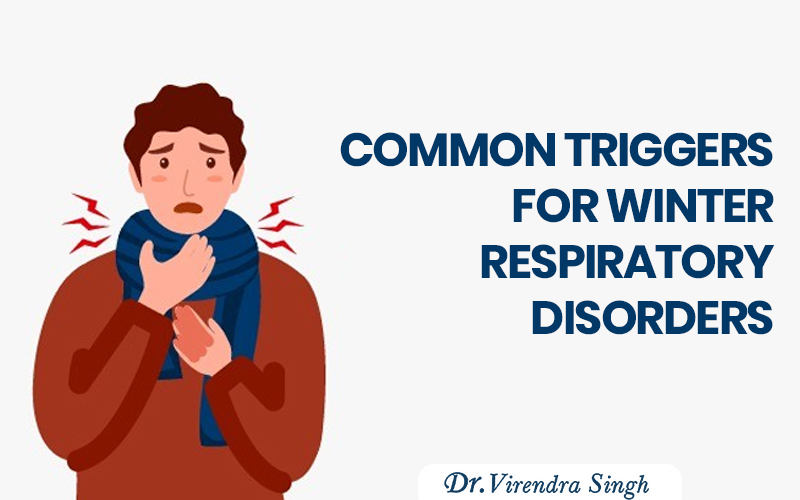
Common Triggers for Winter Respiratory Disorders: As the cold grip of winter descends, our respiratory health faces numerous obstacles due to the temperature change. Indoor heating combined with cold, dry air can damage our lungs, increasing their vulnerability to pain and infections. We’ll go over the difficulties that come with winter, how a cold impacts our respiratory system, and practical ways to avoid and treat colds so that your lungs stay happy and healthy throughout the year. Winter brings a host of respiratory challenges, often triggered by dry, cold air and sudden temperature changes. These ailments have the potential to aggravate bronchitis, asthma, and other long-term respiratory disorders by irritating the airways.
Winter is a time when viral illnesses, including the flu and the common cold, flourish and spread quickly in enclosed indoor spaces. Dr. Virendra Singh, a renowned pulmonologist, emphasizes the importance of understanding and addressing common triggers for winter respiratory disorders to maintain healthy lungs during the colder months. According to him, one of the main irritants is cold, dry air, which frequently narrows the airways and exacerbates asthma and chronic obstructive pulmonary disease (COPD).
Dr. Virendra Singh also highlights the role of indoor pollutants such as mold, dust, and smoke from heating devices, which can exacerbate respiratory symptoms. His best advice for effectively battling these triggers is to maintain appropriate interior humidity, wear protective gear like masks and scarves outdoors, and strengthen immunity with a balanced diet and flu vaccinations.
COPD Specialist, Asthma Specialist, ILD Lung Specialist, Sleep Apnea Specialist
Challenges Faced Due to Winter Weather
-
- Cold and Dry Air: The cold, dry air of winter can irritate the respiratory system, causing discomfort and irritation. Additionally, dry air can remove the mucus layer that protects the airways, which allows bacteria and viruses to more easily enter.
- Indoor Heating: While indoor heating offers comfort, it can contribute to dry indoor air. Additionally, for people who are already susceptible to lung disorders, heating systems may exacerbate respiratory problems by circulating dust and other particles.
- Increased Risk of Infections: The cold and flu seasons are well-known during the winter months. The spread of these infections is aided by individuals being close to one another inside, and viruses that cause these illnesses are more common during the winter months.
How Catching a Cold Works?
It is crucial to take proactive steps to maintain your respiratory health since getting a cold includes being exposed to and then infected by viruses, mostly rhinoviruses. Since these viruses enter the body through the nose, eyes, or mouth and spread through respiratory droplets, it underscores the significance of maintaining good hygiene practices, such as using tissues, regular handwashing, and avoiding close contact with individuals who are sick.
By being mindful of these transmission pathways, you can minimize your risk of exposure. Moreover, your body’s defenses against these viral invaders can be strengthened by putting an emphasis on your general respiratory health through habits like drinking enough water, eating foods that enhance your immune system, and keeping your surroundings clean and well-ventilated.
Prevention Tips
- Bundle Up: Wear warm clothing outside to protect yourself from the cold. Avoid direct exposure to cold air by covering your mouth and nose with hats, scarves, and layers of clothing.
- Don’t Skip Medications: Individuals with respiratory disorders need to keep an inhaler close at hand during the winter and continue taking their prescription drugs as directed.
- Stay Hydrated: Combat the dryness of winter air by staying well-hydrated. To keep your respiratory tract’s moisture levels stable, drink a lot of water.
- Practice Good Hand Hygiene: Frequently washing your hands with soap and water can help reduce the spread of viruses. When hand cleaning is not an option, keep a hand sanitizer on hand.
- Maintain a Healthy Lifestyle: Regular exercise, a well-balanced diet, and adequate sleep contribute to a robust immune system. Make sure you acquire the nutrients you need to maintain your general health.
- Avoid Strenuous Outdoor Activities: Running and jogging are examples of physically demanding activities that can leave you weary and gasping for air, which can lead to breathing issues. Instead, try performing light exercises at home. Exercises involving breathing are very helpful for increasing lung capacity.
- Eat Healthy and Stay Hydrated: A wholesome diet and plenty of water can work wonders for your lungs. Carrots and red bell peppers have been shown to effectively reduce the symptoms of asthma and enhance lung health in general.
Management Tips
- Humidify Your Indoor Space: Moisture is added to indoor air using a humidifier. This calms inflamed airways and keeps the respiratory tract from drying up.
- Air Purification: To improve indoor air quality, purchase air purifiers with HEPA filters to eliminate airborne particles and other irritants.
- Avoid Tobacco Smoke: Respiratory disorders can be exacerbated by smoking or being around secondhand smoke. Avoid tobacco products and areas where smoking is allowed.
- Prompt Treatment: Seek medical help right away if you have respiratory symptoms or a cold. Recovery can be facilitated by treatments like antiviral drugs or symptom-relieving techniques.
FAQs
What are the main triggers for respiratory problems in winter?
In winter, cold, dry air, interior pollutants like mold and dust, viral illnesses (like the flu or cold), and exposure to smoke from heating appliances are the main causes of respiratory issues. These factors can irritate the airways, leading to conditions like Bronchitis, Asthma, and Sinusitis.
How does cold air affect the respiratory system?
The airways narrow in cold air, making breathing more difficult and raising the possibility of respiratory distress. People who have asthma or other long-term respiratory disorders may experience wheezing, coughing, and dyspnea when exposed to cold air.
Why are viral infections more common in winter?
Winter is a season when viral diseases like the flu and the common cold are more common because people spend more time indoors in close quarters, which facilitates the spread of viruses. The colder weather also weakens the immune system, making it harder for the body to fight off infections.
Can indoor heating affect my respiratory health?
Yes, heating inside can cause the air to become dry, which can irritate the respiratory system. Additionally, it can spread dust, allergens, and other pollutants, exacerbating sinusitis, asthma, and allergies. Humidifiers can help reduce symptoms and regulate the moisture content of indoor air.
What precautions can I take to prevent respiratory issues in winter?
Wearing masks and scarves while you’re outside, humidifying the air indoors, avoiding cigarette smoke and other pollutants, and maintaining proper hygiene—including frequent hand washing—are all ways to prevent respiratory problems. Vaccinations against flu and other viral infections can also help reduce the risk.
